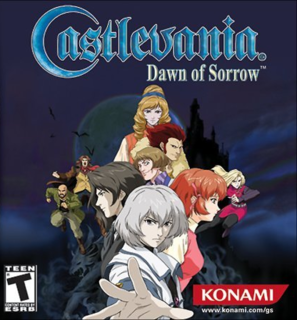Yes, it is yet another Metroidvania game - one that has almost perfected Konami's tried-and-true gaming formula.
While the fact that Castlevania has barely changed since the release of Symphony of the Night is a tad annoying, the level of criticism Konami gets for this is, in my opinion, bizarre, considering the number of games of various other genres we see that barely deviate from previous games in their respective series, or even other games in the genre, that have absurd praise heaped upon them. For example, what did Halo 2 do to really differentiate itself from the original? Other than the fact that God of War was a particularly well-made one, what makes it better than every other ham-fisted button-mashing 3D brawler out there?
It is this praise for many such games I find particularly galling; while games like God of War et al reward your ability to hit the attack button until everybody dies, Castlevania is, and has always been, a welcome alternative with gameplay that actually rewards patience, alertness and skill.
Dawn of Sorrow, in particular, meets my notion of gameplay goodness; while the gameplay in all Castlevania games has been excellent, in Dawn of Sorrow it has been balanced to a degree that has not been achieved in any game in recent memory, nor indeed any other in the series. No playstyle is inherently better than any other; which equipment and souls you choose to use are completely up to personal preference, and unlike in many other games, you will never suffer for not using a particular weapon or not finding a particular piece of equipment.
Additionally, Soma controls better than any other Castlevania hero that has come before; his moves are easy to execute, and the enemies he faces have attacks that meet in that happy place right between “difficult to dodge” and “impossible to dodge.” This facet of Dawn of Sorrow is realised especially well in the game’s boss battles, many of which will be some of the most enjoyable you’ll ever encounter – guaranteed. And nothing has ever put a Castlevania gamer “in the moment” before quite like the drawing of magic seals to vanquish the game’s bosses.
However, Dawn of Sorrow is not without flaws gameplay-wise. The fact that yes, the game does play similarly to previous Castlevanias not withstanding, the game still retains facets that mar an otherwise perfect experience in terms of control. Some bosses, like in all Castlevanias, pale in comparison with some of the game’s better fights and seem to have been added to serve only as filler. The same can be said of some of the games regular enemies as well, which seem to exist only to test your ability to use potions and not your skill, with attacks that will hit you regardless of what you do. Finally, the game’s last boss, without giving too much away, was, to me, a disappointment.
The presentation of Dawn of Sorrow is brilliant as well; the game sounds wonderful, with, considering technological inferiorities, a soundtrack that almost meets the lofty standard set by Symphony of the Night. Other than a couple of drab areas and a disappointing face-set, Dawn of Sorrow is definitely the best-looking Castlevania game; the character sprites are superbly animated, and some of the backgrounds will shock you with how jaw-droppingly gorgeous they are.
As a fan of the series who will play through these games multiple times regardless (and spend ages getting every soul, all the best weapons, etc), there is plenty of replay value for me, but even individuals who aren’t likely to savour the sweet nectar of meticulous over-completion will find plenty to keep them occupied; Boss Rush mode, Julius Mode and a great Sound Mode add plenty of life to an already reasonably lengthy adventure.
In closing, Dawn of Sorrow is undoubtedly the best ‘Metroidvania’ game yet. While it’s not really anything terribly new, it comes closer to perfecting Symphony of the Night’s original formula than any other game in the series.

